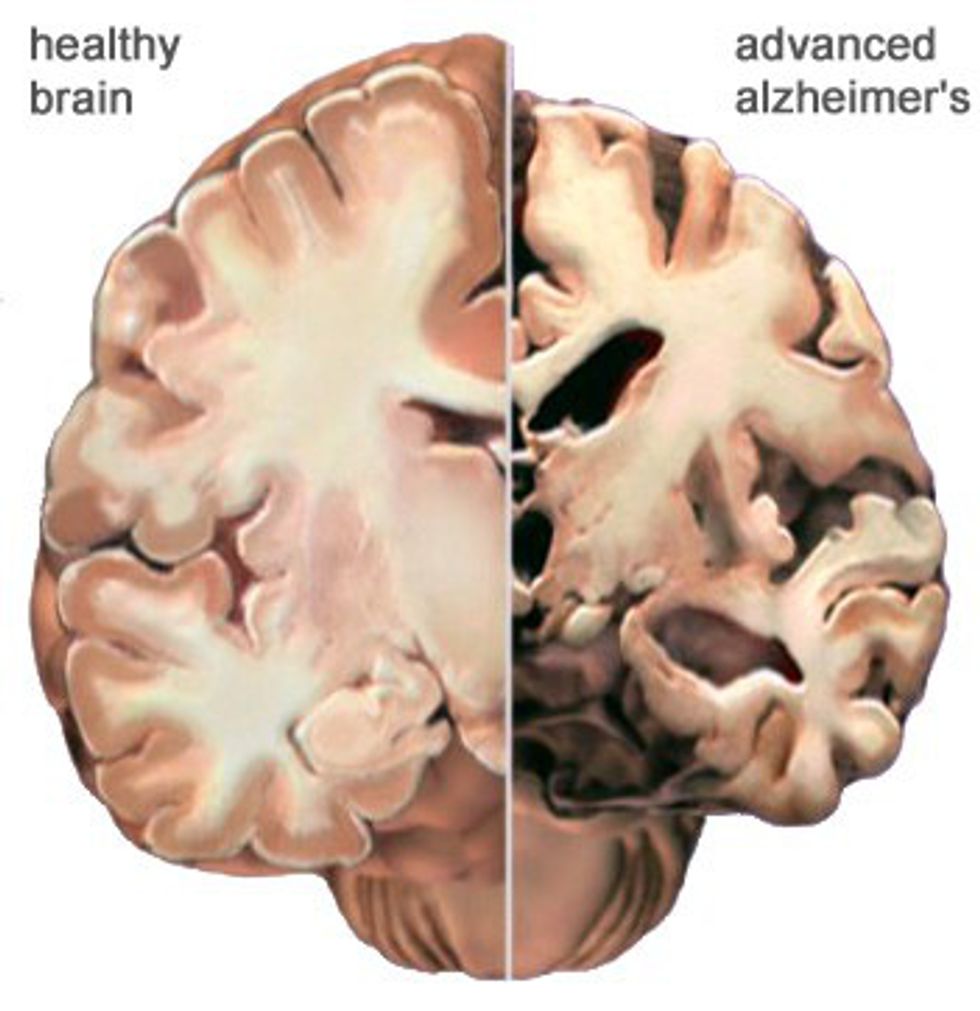June is Alzheimer's Awareness Month. So in honor of the month, take a minute to learn about the disease and its implications.
Everyone knows what Alzheimer's disease is. It's the chronic, tragic disappointment you see on a person's face, in reality or in the movies, when her loved one cannot remember their cherished memories together. For most of us, memory is a faculty of our brain that we take for granted. We rely on it everyday, from knowing the route to work to the name of that distant cousin at family parties to avoid awkwardness. Our memory has been there for us — except when we are trying to find our keys.
Alzheimer's disease is usually associated with a wrinkled face, gray hair and slow pace. Though the majority of Alzheimer's patients are 65 and older, Alzheimer's is not an expected part of growing old. Alzheimer's disease is an irreversible, progressive disease, meaning it worsens over time, and causes memory, thought and behavior deterioration. It is the sixth leading cause of death in the United States and third amongst the elderly population. How is this disease persisting? What even IS Alzheimer's? Let me first clear up the common misconception that dementia is Alzheimer's disease.
Dementia is NOT Alzheimer's disease. According to the Alzheimer's association, dementia is "a general term for a decline in mental ability severe enough to interfere with daily life." Alzheimer's disease is the most common FORM of dementia, accounting for 60-80 percent of dementia patients. The second most common form is vascular dementia, which usually occurs after a stroke. Another misconception is that dementia is "senility." But this implies that reduction in mental abilities is a normal part of aging.
To be considered to have dementia, at least two of the following symptoms must be greatly impaired: memory, communication, ability to focus, reasoning and judgement and perception. Though memory loss issues does not mean one has dementia or Alzheimer's disease, it is best to get checked out by a doctor. The saying, "better safe than sorry" is pertinent in early detection for dementia as treatments will be available sooner.
What causes Alzheimer's disease? Let us delve into the category Alzheimer's fits in: neurodegenerative disorders. These are also called tauopathies, which share an accumulation of the hyperphosphorylated (fully saturated phosphorylated sites) form of a protein called tau in the affected neurons (brain cells) of patients.
In research I have done with Dr. Kuo at Michigan State University, we investigated different forms of the protein tau and compared the levels at which they aggregated through multiple procedures and experiments. Through the seven weeks of research, we confirmed that a couple of the forms of tau are contributors to the accumulation of neurofibrillary tangles, which are found in patients with Alzheimer's disease and are thought to assist with cell death in the brain.
Cognitive decline can be better prevented through some simple adjustments to one's lifestyle. Doing cardiovascular workout, taking an educational class, maintaining proper health of the heart, taking preventative measures with safety (seatbelt, helmet, etc), eating a healthy diet, getting an adequate amount of sleep, taking care of mental health, being social and challenging the mind reduce the onset of brain function regression.
Forty-seven million people are suffering from Alzheimer's and other forms of dementia from all around the world. This means millions and billions of hearts are breaking and money is being spent because a loved one lost the ability to recognize and act the way he used to. Family members are acting as caregivers, spending more than $5,000 a year for someone with Alzheimer's. Unfortunately, as of now, the terrible truth is there is no cure. To help the Alzheimer's Association, spread awareness of the disease by sharing on social media, making a donation, advocating for Alzheimer's patients' families against Congress, walking for "Walk to End Alzheimer's," or more through this website. Let's not forget the lives neurodegenerative diseases have taken — make their lives unforgettable through awareness and a healthy lifestyle.























